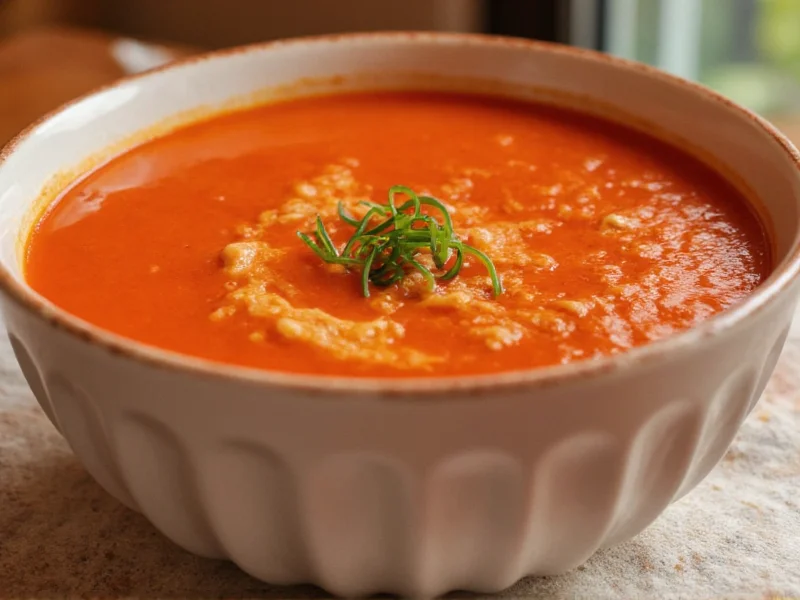When you're feeling under the weather, choosing the right foods matters. Tomato soup has been a go-to remedy for generations, but does it actually help you recover? Let's examine the science behind this comforting classic.
Nutritional Benefits of Tomato Soup During Illness
Tomato soup offers several components that support your body when fighting illness. The primary benefits come from:
- Vitamin C - Essential for immune function and reducing cold duration
- Lycopene - A potent antioxidant with anti-inflammatory properties
- Hydration - Warm liquids help maintain fluid levels when you're dehydrated from fever
- Easily digestible - Gentle on the stomach when appetite is low
- Warmth - Soothes sore throats and clears nasal passages
Research shows that lycopene, the compound that gives tomatoes their red color, has significant antioxidant effects that may help reduce inflammation associated with colds and flu. A study published in the Journal of Nutrition found that lycopene supplementation reduced upper respiratory symptoms in test subjects.
Tomato Soup vs. Chicken Soup: Which Is Better When Sick?
Many people debate whether tomato soup or chicken soup is superior for illness recovery. Both have merits:
| Feature | Tomato Soup | Chicken Soup |
|---|---|---|
| Hydration | Excellent | Excellent |
| Vitamin C | High | Low |
| Protein content | Low | High |
| Anti-inflammatory properties | High (lycopene) | Moderate |
| Best for | Colds, sore throats | Flu, fatigue |
While chicken soup provides more protein for energy during recovery, tomato soup delivers higher levels of vitamin C and lycopene. For respiratory symptoms like congestion and sore throat, tomato soup's acidity can help break up mucus more effectively than chicken soup.
When Tomato Soup Helps Most
Tomato soup provides the most benefits for specific illness scenarios:
Cold and Sore Throat Relief
The warm liquid soothes irritated throat tissues while the acidity helps thin mucus. Adding a squeeze of fresh lemon juice boosts vitamin C content further. For sore throats specifically, the warmth of tomato soup provides immediate comfort while its nutrients support healing.
Early Stage Flu Symptoms
During the initial stages of influenza, when symptoms include congestion and mild fever, tomato soup's hydration and antioxidant properties can help your body fight the virus more effectively. The heat also helps clear nasal passages.
Recovery Phase Nutrition
As you begin recovering, tomato soup provides easily digestible nutrition when your appetite returns. The lycopene content continues supporting your immune system as you regain strength.
When to Avoid Tomato Soup When Sick
Despite its benefits, tomato soup isn't ideal for all illnesses. Avoid it when experiencing:
- Stomach flu or vomiting - The acidity may irritate an already sensitive stomach
- Acid reflux flare-ups - Can worsen heartburn symptoms
- Severe nausea - The strong flavor might trigger further nausea
In these cases, a milder broth-based soup would be more appropriate. Listen to your body—if the acidity bothers you, switch to a different remedy.
Maximizing Tomato Soup's Benefits When Sick
You can enhance tomato soup's effectiveness as a sick-day remedy with these simple additions:
- Add garlic - Contains allicin, which has antimicrobial properties
- Include fresh ginger - Reduces inflammation and nausea
- Sprinkle turmeric - Powerful anti-inflammatory compound curcumin
- Stir in a spoonful of honey - Soothes sore throats (not for children under 1)
- Add cooked quinoa - Provides protein for recovery without heaviness
Homemade tomato soup generally offers more benefits than canned varieties, as you control the ingredients and can avoid excess sodium. If using canned soup, look for low-sodium options and consider diluting with additional broth or water.
Scientific Evidence Behind Tomato Soup for Illness
Several studies support tomato soup's role in supporting recovery:
- A 2020 review in Nutrients found that lycopene reduces inflammatory markers associated with upper respiratory infections
- Research in the American Journal of Clinical Nutrition showed vitamin C can shorten cold duration by 8% in adults
- A study from the University of Nebraska Medical Center confirmed that warm liquids like soup improve mucociliary clearance
While tomato soup isn't a cure, these studies confirm it provides meaningful support to your body's natural healing processes when you're sick.
Practical Recommendations for Sick Days
For optimal benefits when using tomato soup as part of your recovery plan:
- Consume while warm but not scalding hot to maximize throat soothing
- Pair with rest and adequate hydration from other sources
- Eat small portions frequently rather than large meals
- Choose low-sodium versions if you have concerns about blood pressure
- Combine with other vitamin C-rich foods like oranges or bell peppers
Remember that while tomato soup supports recovery, it works best as part of comprehensive care including rest, hydration, and appropriate medical treatment when needed. It's a valuable component of home care for mild illnesses but shouldn't replace professional medical advice for serious conditions.











 浙公网安备
33010002000092号
浙公网安备
33010002000092号 浙B2-20120091-4
浙B2-20120091-4